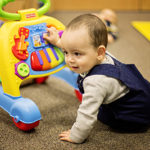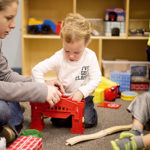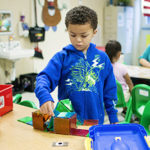Topic C: Know Each Child’s Abilities and Characteristics
At each stage of a child’s development, certain types of injuries are more likely to occur. Knowing and understanding how children develop will help you to predict and prevent most injuries.
Injuries may occur because: Infants (birth-12 months)
- Roll over
- Sit up and crawl
- Reach for objects and pull things
- Want to test and touch things
- Grab onto things to pull up
- Explore objects by putting them into their mouths
Injuries may occur because: Toddlers (13-35 months) 
- Walk and run
- Like to go fast but are top-heavy, unsteady, and have trouble stopping
- Learn to climb up before learning how to climb down
- Learn to open doors, gates, and windows
- Lack enough upper body strength to pull self out of a bucket, toilet, etc.
- Enjoy water play and watching the toilet flush
- Put small things into containers and small openings
- Are curious and explore everything, but do not understand the concept of danger
- Lack depth perception and may not realize how high they are
- Eat while they are laughing or walking and running around
Injuries may occur because: Preschoolers (3-5 years)

- Expand their physical abilities to be able to jump, valance, hop, skip, run, and climb
- Like to figure out how things work and fit together
- Are curious and like to experiment with cause and effect
- Like to garden and help cook
- Do not understand the difference between pretend and reality and
- Imitate superheroes and comic figures
- Learn to swim
- Eat while they are laughing or walking and running around
Injuries may occur because: School-age Children (6-12 years)

- Master more complex physical skills, such as roller skating, jumping rope, gymnastics, and skateboarding
- Become involved in sports
- Become more independent and explore their neighborhood (bringing them into contact with more dangers)
- Enjoy science experiments
- Prepare food for themselves
Injuries may occur because: Infants (birth-12 months)

- Roll over
- Sit up and crawl
- Reach for objects and pull things
- Want to test and touch things
- Grab onto things to pull up
- Explore objects by putting them into their mouths
Injuries may occur because: Toddlers (13-35 months)

- Walk and run
- Like to go fast but are top-heavy, unsteady, and have trouble stopping
- Learn to climb up before learning how to climb down
- Learn to open doors, gates, and windows
- Lack enough upper body strength to pull self out of a bucket, toilet, etc.
- Enjoy water play and watching the toilet flush
- Put small things into containers and small openings
- Are curious and explore everything, but do not understand the concept of danger
- Lack depth perception and may not realize how high they are
- Eat while they are laughing or walking and running around
Injuries may occur because: Preschoolers (3-5 years)

- Expand their physical abilities to be able to jump, valance, hop, skip, run, and climb
- Like to figure out how things work and fit together
- Are curious and like to experiment with cause and effect
- Like to garden and help cook
- Do not understand the difference between pretend and reality and
- Imitate superheroes and comic figures
- Learn to swim
- Eat while they are laughing or walking and running around
Injuries may occur because: School-age Children (6-12 years)

- Master more complex physical skills, such as roller skating, jumping rope, gymnastics, and skateboarding
- Become involved in sports
- Become more independent and explore their neighborhood (bringing them into contact with more dangers)
- Enjoy science experiments
- Prepare food for themselves
